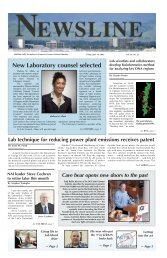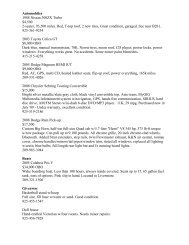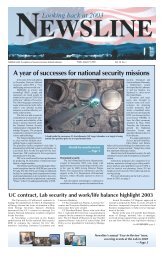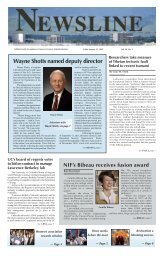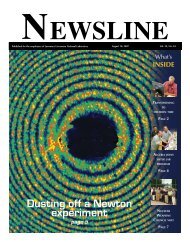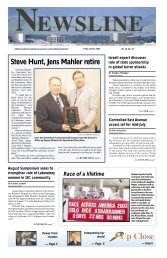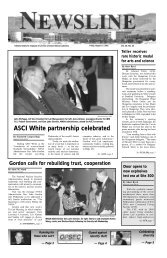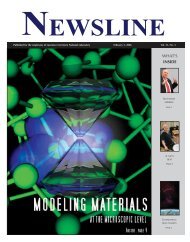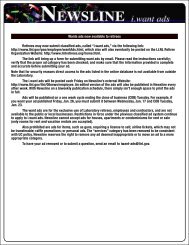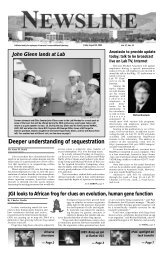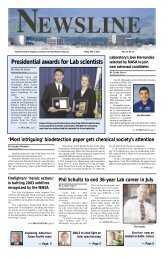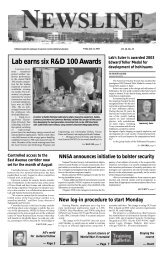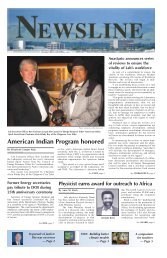6 Newsline AUTOMOBILES 1978 - VW Bug Convertible. Gre<strong>at</strong> Collector Car. New motor, muffler, tires, exhaust, and paint! A real cute car! Blue w/white top and interior. 209-835-8066 1984 - 1984 FORD BRONCO 4-Sale 4*4, Autom<strong>at</strong>ic, Good Cond., RollBar, TowPackage,CD Player, Running Boards, Low miles on Rblt. Mtr, $3500.00 925-381-2359 1995 - Ford Explorer 4 by 2,all power, tower package, new tires. Excellent condition. A must see. $7,000.00 OBO 510-537-7222 1994 - Acura Integra, 148Kmi, AC, AM/FM/Cassette, ABS, Dual air bags, moon roof, power doors, alarm w/ keyless entry. $5000 obo. 209-473-7764 2000 - Honda Civic EX Coupe, Silver, excellent condition, 5-speed,sunroof,40k mi.,air, cruise,power windows,CD, $13,000 OBO. 510-338-1199 1997 - Honda Civic EX couple. Gre<strong>at</strong> condition, 5 speed, 30+ MPG, 83K highway miles. Asking $8400/BO 925-443-0889 1971 - Volkswagon bettle. Does not run, body in decent shape. 400$ OBO. 209-869-2029 1989 - Cadillac Seville 4-door, le<strong>at</strong>her interior, good condition. Professionally maintained by AAA mechanic $3500 or BO. 925-455-9546 1985 - Volvo, 240 DL, blue, AT, AC, FM Cass, runs gre<strong>at</strong>, clean interior, 25 MPG. $1,800 OBO. 209-836-5671 1996 - Dodge St<strong>at</strong>us, runs gre<strong>at</strong>, 108,000 miles, A/C, C/C, 2.46, 4 cyl, $3750 OBO. Altern<strong>at</strong>e phone # 925-634-5702. 925-513- 8494 1999 - Toyota4runnerSR54WD ExcellentCondition Loaded 69500mil No/offroad Thule4bike StellarBlue high altitude enginechip for mountainDriving 22000 OBO 925-355-9144 1985 - Nissan Maxima SE 6 cyl, 5-speed manual, 235K miles, runs gre<strong>at</strong>, recent smog, well-maintained, all records, $1700 obo 925- 447-6719 1997 - Honda Accord. 4 door. V6 engine. Auto trans. Moon roof. Alarm. Cool wheels and tires. Lowered. CD player. Excellent condition. 925-455-6648 1997 - Red Honda Predule..alloy wheels, ABS, L.Se<strong>at</strong>s, Moon Roof, Spoiler, new B<strong>at</strong>tery, nearly new tires, 54k, $14,500 ex.condition. Garage kept. 925-373-1964 1995 - Pontiac TransAm, Blue/Green, 6 speed, Pwr everything, 10 speaker stereo, 70K miles, Le<strong>at</strong>her, One owner, Looks and runs gre<strong>at</strong>. $10,000. 510-247-0294 1994 - BMW 325i 4 door 5 spd. cd changer, new brakes/clutch. runs and looks gre<strong>at</strong>. $10,000 OBO 925-240-7019 1985 - Jeep CJ7-4X4 Restoring, hard top/doors, roll bar, new eng, clutch, radi<strong>at</strong>or, b<strong>at</strong>tery, tires, custom rims, etc. Needs minor body work/paint $5990 925-443-7408 1989 - Oldsmobile Ciera 4D, V6, Grey, Autom<strong>at</strong>ic, PS, PW, Power Door Locks, New CD Player, 95K, Good Condition, $1600/OBO 925-961-0786 1999 - Acura 3.0CL, V6, fully loaded, CD, sunroof, le<strong>at</strong>her, 4yr/50K wrnty, 25.5K miles, $23K OBO, Excellent Condition. Call 925- 426-7400. 925-426-7400 1983 - Ford Thunderbird, A/T, V8, custom tires and rims, black exterior, runs good, must see $1100 obo. 510-538-7444 AUTOMOBILE ACCESSORIES Transmission - Turbo 350 from 1981 Buick. Less than 10K miles. $150. 209-835-3919 Tires, 265/75 16 inch mud and snow mounted on 6 lug Chevrolet aluminun alloy factory wheels. 16k on tires.$250 925-447-4611 Misc. used VW bug body parts. Running boards,bumpers, he<strong>at</strong>er boxes, etc. BO 925- 443-4350 Pickup Shell, Black Aluminum /Carpet Kit, Blue Gray. Fits 6ft. Chevy Short Bed. $150. Or Obo 209-836-3709 GM 99 & up Truck Accessories: Flowmaster c<strong>at</strong>-back exhaust-$250, R&D Fog light controller-$20, ProTecta bed m<strong>at</strong>-$60, All like new... 209-365-0412 BICYCLES Bicycle headlight, dual beam NiteRider, mounts on bars with b<strong>at</strong>tery in drinkholder. Has high-low switch. Very bright, asking $110, new price $260 925-484-4099 1996 Sidekick Scooter w/Canopy for the phys- CLASSIFIED ADS ically challenged $900.00 OBO 925-456- 6720 BOATS 1977- 19 ft Sea Ray bowrider in gre<strong>at</strong> condition! V8. I/O motors. 380 hrs. Bimini top. Se<strong>at</strong>s 6-8. $3,695/ob. 209-463-9900 to test drive! 209-832-2790 ELECTRONIC EQUIPMENT Laptop IBM ThinkPad 600E, 266mhz PII/64mb/4gb HD/CD/floppy/modem. 13 inch screen. Excellent condition. $450. 925- 743-9519 Answering Machine-AT&T Digital Style AS45(formerly 1718-check web page). 1 year use. Works. $10. Have <strong>at</strong> lab office. 925- 456-7826 TUMI Computer Briefcase (#2670). Ballistic Nylon w/ Safecase Laptop Insert. Execllent cond. $100/obo 925-447-4462 Playst<strong>at</strong>ion w/ internal Mod Chip (can play imported and copied games) & 2 controllers. Covert Dawn game. $65 925-292-8762 HP Office Jet Model 350 Fax/Copy/Print $100 Sue 925-454-1577 Tek 2213 scope w/ probes, svc man $275; HP 1630A logic anal w/ probes, user man $275; 925-454-1577 GIVEAWAY Wood dog house. Accommod<strong>at</strong>es medium/large dog. You haul 925-447-6978 Picket fence, redwood painted white, 32inches, abt 35 ft w/ lots of extra pickets, you remove. 925-294-9022 32 stepping stones aprox. 16X16 dark gray in color. You haul 925-443-5419 Free 32inch Television stand. Came with new TV from Sears. Assembled and used for 30 days. Like new, pickup in Livermore. 925- 292-8762 Beautiful,friendly 8 year old grey c<strong>at</strong> in excellent health. We have an allergy problem. Will provide child support! 650-838-9451 HOUSEHOLD Solid Oak Dresser, Excellent condition, Like New, Measures 59 in. Tall, 48 in,Wide 18 in. Deep, Medium Oak in color. $600.00 O.B.O 925-443-1571 Stereo/Video component cabinet. Vertical design. Walnut veneer finish. Unique piece of furniture very well suited to the task. $150. 925-743-9519 Bed King Size with Box Springs and M<strong>at</strong>tress and Huge mirrored Head Board Good Condition 70 style WAS once a W<strong>at</strong>erbed. Dark Wood Color. $100. 209-835-9082 Entertainment center light oak finish VCR/TV shelf, glass doors stereo storage. Approx 5 w x 4 H x 1 1/2 D. 925-455-9342 Wood coffee table, 36-in L x 18-in W - $25; metal coffee table w/glass top, 44-in square - $40; Danish modern wood desk - $40; rocking chair - $60. 925-245-0915 Evenflow (On My Way) baby car se<strong>at</strong>/carrier, with extra base - $25. 925-837-7463 Antique walnut dresser, 4ftx3ftx22in, needs touch-ups, $95. Vintage(1920s) chaise lounge with skirt, newer lt blue upholstery, vy good cond., $125. 925-516-2774 Roll top desk, Winners only, solid oak, excell. cond. paid $1250 sell for $750 925-447- 4611 CHEST FREEZER, 8.4 cu ft, Wards brand, gre<strong>at</strong> cond., in Lvrmr, moving, must sell. $100.00 925-516-9529 Walnut rolltop desk with 3 large drawers, excellent condition, $250. 925-455-0542 MOTORIZED SCOOTER - for persons with limited mobility, electric rechargable, less than a year old, $1200/obo. 925-449-6821 Oak table- dark finish, new in box, 6 chairs. $350 209-835-4281 Queen size Futon with frame Good condition with new cover $170 OBO. 925-934- 1530 Antiques: Nice Oak rocking chair $80, Treadle sewing machine $75 need refinishing, camel back trunk $90, twinn brass bed $85 925-449-0388 Gre<strong>at</strong> St<strong>at</strong>es Push Reel Lawnmower. Gre<strong>at</strong> cond. $30/obo 925-447-4462 Childrenís Wood bedroom set, includes bunk beds, m<strong>at</strong>tresses, m<strong>at</strong>tress boards, desk, dress- er, mirror, chair. $500.00 209-239-9416 Fisher Price play set with slide. 6 plastic pieces make 2 story 4ft by 4ft house and slide. $10. 209-832-1321 Kenmore Elite Side by Side Refriger<strong>at</strong>or 3 1/2 years old good condition. Recently purchased new house new appliances. $250.00 / BO can deliver. 925-240-5336 3 piece couch-chair-lovese<strong>at</strong> set. Hunter Green, all pieces recline, built in table, Exc. Cond. $250 OBO 209-599-1955 Mirror, 6 ft. 6-1/2 in. by 3 ft. 5 in. Like new. Make offer. Please call before 8:30 p.m. weekdays or anytime weekends. 925-829- 2581 Cradle blonde hardwood w/ bedding $100; baby backpack, jogging stroller $75; 925- 454-1577 Mitsubishi console stereo TV 26 inch $100 925-454-1577 Baby Bouncy Se<strong>at</strong> ($5); Futon with folding wood base, excellent cond. ($150 OBO); misc. baby items. 925-454-9116 LOST & FOUND LOST - silver key ring with two keys, 1/22/02, somewhere between B415 parking lot and B218. 925-443-5890 Lost sentimental gold wired earring w/Amethyst and a diamond on top. If found please call me. 925-439-7394 Found: Labelmaker on corner of Inner Loop near 551E. Claim <strong>at</strong> Pipe Shop if you can identify. 4-3032 MISCELLANEOUS Saddle western Mcpherson all show accessories and silver. This well built saddle is no longer made. Comes with handy roll around saddle rack. $800.00 925-455-9342 Krups mini espresso machine - $15. 925-837- 7463 Childrens playtable + two chairs, Cr<strong>at</strong>e&Barrel, fruitwood, vy good cond., $65 obo. 925-516-2774 Vertical file cabinet with 4 drawers, excellent condition, $65. Antique chest - $250 OBO. Digital photos available. 925-455-0542 1996 Sidekick Scooter w/Canopy for the physically challenged $900.00 OBO 925-456- 6720 Rototiller, 4 ft wide, fits back of any tractor with 3 point hitch. $375 209-847-1231 Mens gold wedding ring, size 9, comfort cut, 2 tone, excellent condition. $250/obo. 209- 835-8976 REI Big Byte Office Backpack w/ computer insert. Many extra pockets. Excellent cond. $40/obo 925-447-4462 CA Symphony 2 orchestra tickets, March 3rd, Hofmann The<strong>at</strong>re, Walnut Creek. Ticket price $45 sell $35 each 925-935-5004 Baby items all excellent condition / look like new. ChildCraft Crib/m<strong>at</strong>tress $150. Graco Swing $25. Combi Stroller $35. 925-275- 9434 Skil 10inch table saw with stand. $50 510- 530-1884 Pickup Shell & Carpet Kit / Black Aluminum & Blue / Gray. Fits 6ft. Chevy Short Bed. $150 Or Obo. 209-836-3709 MOTORCYCLES 1990 - Honda Cbr600 Excellent Condition (Fast).Low Milage. Also 1987 Cbr600 Parts Bike Both For $3000.Obo. 925-516-9678 1987 - Yamaha 350 Moto4 ATV. New tires, carb, and electrical. Very good condition, runs excellent. $1350 OBO 925-443-4350 MUSIC INSTRUMENTS Drum Hardware Mapex Brand cymbal stands. two boom and two straight type. never used! $55 each firm. 925-243-1373 PETS & SUPPLIES AquaClear aquarium filter. Ideal for 30-50 gallon tanks. $10. 925-245-4570 Travel kennel for up to 25 pound pet. $15. 650-364-5951 Horse Fore Sponser In Oakley.$75.00 Per. Mo. 16h Thourghbred Very Sweet.Rides English/West 19yr Old Gelding.Perf Female Rider.Has Shown 4h Call 925-687-7356 Baby Cock<strong>at</strong>iels Hand Tame $50.00 209-669- 7588 Free to good home, mini-rex rabbit, pedigreed, buck, very nice. 925-706-2088 Free c<strong>at</strong> to good home. Please call 925-516- 9293. Large Dog Cage new. Purchased for $110 selling for $65 925-449-3821 Sale 2 Addorable Dachound (Winner Doggy) 8-Weeks. Old Asking $150.Oo No Papers. But Full Breed. Blk/Tan. 209-521-4846 Maltese. Male, AKC, 2 yrs old. Free to good home. 925-642-5339 10 month Registered German Shorthair Pointer, Liver/Ticked. FCH Snappy Tom Bloodlines. Started Obedience Training. 209- 869-5362 Horse Boarding - 2 ac. pvt. Pleasanton orchard pasture, shelters, cyclone fences, $150 per month includes grass hay and alfalfa twice a day. 925-443-6531 RECREATION EQUIPMENT New K2 Merlin VI 178cm skis w/Marker bindings, used twice, $395; Nordica boots sz 8, $25; other ski/board stuff. 925-443-3106 Wooden Playset - Good condition (3 years old from Costco) Includes fort, slide, swings, monkey-bars. $150/obo. U-haul 925-275- 9434 Snowboard Package: Burton Rippey freeride snowboard (158.5 cm), bindings, boots (le<strong>at</strong>her, size 9), padded board bag, all like new. $350 obo. 925-249-1640 Express your commute, call 2-RIDE for more inform<strong>at</strong>ion or visit http://www-r.llnl.gov/tsmp. PATTERSON - Vanpool has se<strong>at</strong>s available. Work hours 7:30-4:00. Call Kim 209-892- 2118, ext. 2-9502 DANVILLE - Camino Tassajara & Crew canyon (near Blackhawk) - 2 drivers/riders seeking additional members to carpool from south Danville area. 8:00 - 4:45 925-736- 9441, ext. 2-1039 Orinda-Moraga-Lafayette - Lamorinda carpool needs 4th rider/driver. Lab hours 8:15am- 5pm. Departs/returns to St. Stephens and Highway 24 in Orinda. 925-253-0498, ext. 2-9823 TRACY - Carpool looking for passengers. Hrs 8-4:45. 209-833-1201, ext. 2-9955 Modesto - Luxury van. 14 psgr. 8 - 4:30 schedule. $110/mo. plus other $$ off for transit pretax and if you want to share driving. 209-521-9047, ext. 2-5177 Sacramento - Moving to Sacramento area in February. Looking to join vanpool/carpool. Call if you have a spot. Ask for Carolyn. THANKS! 209-823-8309, ext. 2-3399 Modesto - 8-4:30 luxury van leaves from Vintage Fair Mall with drop off and pickup near office on site. 209-545-3866, ext. 3- 8056 SERVICES TUTORING in high school and college m<strong>at</strong>h and chemistry. 925-443-2095 Handyman/Builder. 32 years experience, all trades. Reasonable r<strong>at</strong>es, lab references. 209- 835-7270 House Painting - Exterior & Interior, over 16 yrs exp. Free estim<strong>at</strong>es. 925-447-5132 Windshield chip repair, do the prevent<strong>at</strong>ive measure, right on site. 209-234-2314 New years resolution? ACSM Certified Fitness Trainer can help you reach your goals or train for an event. In your home or <strong>at</strong> gym. 925- 292-8762 painting,interior,exterior,quality paint quality work.ne<strong>at</strong> and clean.free est 925-447-4648 Professional Wedding Photography, specializing in B&W. Portfolio available 510-658- 2577 Roofing, 28 yrs experience, fully insured, free estim<strong>at</strong>es 925-454-9200 SHARED HOUSING Sunol: - Seeking housem<strong>at</strong>e for 3BR/2BA creekside cabin in Kilkare Woods. 1800 sq.ft., fireplace, huge kitchen w/DW, W/D. $1300/mo. Call 650-302-0514 Friday, February 1, 2002 See complete classified ad listings <strong>at</strong> https://www-ais.llnl.gov/newsline/ads/ RIDESHARING TRUCKS & TRAILERS 2001 - Ford Ranger Edge SuperCab 4x4. 7k miles. Auto trans. 4 liter engine. Tow package, extras. 19k OBO. 925-443-4639 2001 - Jeep TJ Wrangler Sport, RED,w/dark grey interior,AC,CD/AM/FM Radio,lifted 3 inches, custom rims, Low Miles, Excellant Condition. Asking $22.5K, OBO 925-373- 8244 1992 - Ford F250. Over $5k new stuff. New tires/wheels, paint, campershell, bedliner & carpeted storage kit, brakes & more! $5,995/obo. 209-832-2790 1992 - Dodge Dakota Club Cab with V8, AC, PS, Cruise, Casette, Camper Shell, Tilt Wheel, Alloy Wheels. 130,000 Miles, Excellent Condition. $5500 209-239-3485 1994 - Jeep Wrangler 4X4, 4.0, 6cyl. ,5sp., Red/Gray,bikini softtop,Sony cassette,alarm, 72k miles, alloy wheels, bikerack. cell 925- 640-8561 $9,999 obo 925-513-1991 1984 - Toyota pick-up w/camper shell, very good condition, clean, ac, ps/pb. 113K, $1,600. 925-447-2830 1969 - GMC 1/2 ton 4x4,long bed, auto,strong 454ci, 411 gears, lifted, many extras, must see, $6000 OBO 925-463-0650 1997 - Chev. Suburban LT2500,454ci, auto, le<strong>at</strong>her, CD, 3 inch lift, tinted windows, 42K mi, exc.cond, $25,500 925-463-0650 1988 - 26 ft Comfort trailer by Kit. 2 axels, new propane tanks. Triple bunks. A/C, MW, Outside trim recently refurbished. $5000 or BO. 925-447-5359 1989 - Toyota Truck, 4x4,5speed, $3000/BO 925-846-5374 2000 - Dodge Dakota, 2WD, V6, Club Cab, SLT, AC, CD player, excellent condition, 20K miles, $16,500 or BO 916-321-1596 1988 - Door mount swing away mirror of pickups, vans, or campers. $10. 925-245- 4570 1978 - Chevy Luv long bed pick-up, 4 spd, 4 cly, runs gre<strong>at</strong> and looks gre<strong>at</strong> too $1500 obo 510-881-5444 VACATION RENTALS Kihei, Maui, HI - Kamaole Sands one bedroom, two b<strong>at</strong>h, large lanai with a garden view. 925-461-3698 MAUI Kihei oceanfront condo: beautiful ocean view, white sandy beach, pools, tennis, BBQ, whale w<strong>at</strong>ching, snorkeling. Low LLNL r<strong>at</strong>es. 925-846-1459 Maui, HI - Kahana Reef oceanfront 1BR/1BA condominium. Beautiful two-island view, oceanside pool, and BBQs. Low LLNL r<strong>at</strong>es for year-round reserv<strong>at</strong>ions. 925-449-0761 SOUTH LAKE TAHOE - 3 Bedroom 2 b<strong>at</strong>h Chalet, newly remodeled, nicely furnished,all amenities,close to all skiing, Reserve Now! 209-599-4644 SOUTH LAKE TAHOE- Huge 3/2/2car, family rm w/frpl, hot tub, game rm w/bar & pool table, gre<strong>at</strong> loc<strong>at</strong>ion, n/s/pets 925-487-3871 WANTED Wanted, Pop up type 8 foot cab over camper. Stove, Refriger<strong>at</strong>or, w<strong>at</strong>er system not necessary. Will consider a unit th<strong>at</strong> needs some repair work. 209-754-1990 Drafting Table 925-449-1340 Wanted- Recumbant Exercise bike, slight used. for elderly person. 510-537-7222 Drum set for young teen. Reasonable price. 925-443-6052 Please call if you have a 55 gallon or over aquarium with/stand if. I am willing to pick up anytime! 510-693-0162 Wanted: Mac OS9.0+ CD 209-835-4281 Old wind up record players, complete or part. Also interested in old Wood tube radios and jukeboxes 925-449-0388 Treadmill. Want one in good condition. Prefer one in Tri-Valley area and $200 maximum. 925-449-7262 WANTED: Storage shed metal or wood. If it meets the need I will tear down and move. 209-892-5885 Looking for an old computer monitor or Old PC laptop. Nothing hi-tech. 925-292-1581 Wanted: girls size 10/12 ski pants. 925-706- 2088 Due to space limit<strong>at</strong>ions, Newsline may withhold ads th<strong>at</strong> have already run. They will still appear on the Web.
8 Newsline Friday, February 1, 2002 DIRECTOR’S OFFICE Continued from page 1 terrorism. I have always been an optimist, looking <strong>at</strong> the bright side. But the Lab doesn’t pay me to be eternally optimistic. As the Labor<strong>at</strong>ory’s senior counterintelligence officer, I need to remind you th<strong>at</strong> Lab employees are potential targets of foreign intelligence — simply because we work <strong>at</strong> a n<strong>at</strong>ional labor<strong>at</strong>ory. We have access to inform<strong>at</strong>ion, or to the people who have inform<strong>at</strong>ion, th<strong>at</strong> other people and other countries want. We may be potential targets if others simply think th<strong>at</strong> we have access. This can be true when we travel abroad, when we bring foreign visitors in to our work areas, and even when we socialize. We need to tune our antennae so th<strong>at</strong> when the convers<strong>at</strong>ion is directed toward the parts of the job th<strong>at</strong> we can’t talk about, those antennae start to twitch. Th<strong>at</strong>’s wh<strong>at</strong> security awareness is all about. Knowing where to draw the line is part of our jobs. It’s the reason we have security clearances, and it’s part of working in such a special place with such spe- The former DOE requirement to report close and continuing contacts with sensitive country foreign n<strong>at</strong>ionals has been replaced with broader guidelines th<strong>at</strong> may be easier to understand. DOE now requires reporting of certain professional, personal and financial contacts with sensitive country foreign n<strong>at</strong>ionals. Please see the SAFE Website, http://www-r.llnl.gov/safe/requirements. html #report . Which countries are considered sensitive? You can find the DOE list of sensitive countries <strong>at</strong> http://www-r.llnl.gov/safe/list.html. The 25 countries on the DOE sensitive country list are design<strong>at</strong>ed sensitive for reasons of n<strong>at</strong>ional security, nonprolifer<strong>at</strong>ion, anti-terrorism, or economic security. The DOE reporting requirement applies only to contact with foreign n<strong>at</strong>ionals from these countries, and does not apply to n<strong>at</strong>uralized U.S. citizens or to U.S. permanent resident aliens. Most contacts are reported to DOE via the online foreign contact reporting form <strong>at</strong>: http://www.directives.doe.gov/pdfs/forms/1512-3.pdf. The form is also available from the SAFE Office, L- 046, 2-5557. Professional, personal, financial contacts The certain professional, personal and financial contacts contained in the DOE guidelines are: • Professional contacts and rel<strong>at</strong>ionships with sensitive country foreign n<strong>at</strong>ionals, whether <strong>at</strong> Let it snow, let it snow PHOTOS BY JEFF DEBISSCHOP/SITE 300 AND JULIE KORHUMMEL/<strong>NEWSLINE</strong> cial people People routinely tell SAFE staff members th<strong>at</strong> they’ve traveled extensively to “sensitive” foreign countries and had frequent contact with scientists and others from those countries, and th<strong>at</strong> they have never had a problem. I believe th<strong>at</strong>. However, according to a General Accounting Office (GAO) report published in June 2000, scientists from four n<strong>at</strong>ional labor<strong>at</strong>ories reported <strong>at</strong> least 75 incidents in which DOE personnel were targeted by a foreign intelligence service in efforts to obtain sensitive inform<strong>at</strong>ion and proprietary knowledge. Espionage happens. Wh<strong>at</strong> can we do to protect ourselves? The found<strong>at</strong>ion of the Security Awareness For Employees (SAFE) program is awareness. SAFE offers pre-travel briefings and post-travel debriefings to Labor<strong>at</strong>ory employees who travel to sensitive countries. Pre-travel briefings give you “heads up” inform<strong>at</strong>ion relevant to your destin<strong>at</strong>ion. Post-travel debriefings, on the other hand, are your opportunity to provide a heads-up to Labor<strong>at</strong>ory travelers who will follow your flight p<strong>at</strong>h. work, in the United St<strong>at</strong>es or abroad. • Personal rel<strong>at</strong>ionships. This refers to “substantive” personal rel<strong>at</strong>ionships with sensitive country foreign n<strong>at</strong>ionals (not U.S. resident aliens) other than family members. • Financial rel<strong>at</strong>ionships. These are business transactions with sensitive country foreign n<strong>at</strong>ionals. Two additional types of contacts need to be reported, even if they do not involve sensitive country foreign n<strong>at</strong>ionals. They are: • Unusual solicit<strong>at</strong>ions. Any <strong>at</strong>tempt by anyone to gain unauthorized access to classified or sensitive unclassified inform<strong>at</strong>ion qualifies as an unusual solicit<strong>at</strong>ion. This is not limited to sensitive country foreign n<strong>at</strong>ionals; it applies to foreign n<strong>at</strong>ionals from any country as well as U.S. citizens. • Contacts which involve anomalies. An anomaly is something th<strong>at</strong> is out of the ordinary, for example, knowledge of classified or sensitive inform<strong>at</strong>ion th<strong>at</strong> a business partner or foreign collabor<strong>at</strong>or unexpectedly reveals, and th<strong>at</strong> he or she isn’t authorized to have. Contacts th<strong>at</strong> do not need to be reported The DOE reporting requirement also explains th<strong>at</strong> you do not need to report the following: • Contacts with family members, including rel<strong>at</strong>ives and in-laws, who are foreign n<strong>at</strong>ionals. • Limited, essentially public contact with foreign n<strong>at</strong>ional neighbors, teachers and tradesmen. NON-PROFIT ORG. U.S. POSTAGE PAID LIVERMORE, CA PERMIT NO. 154 Newsline UC-LLNL PO Box 808, L-797 Livermore, CA 94551-0808 As temper<strong>at</strong>ures dropped below freezing this week, snow fell in the hills surrounding the Lab. Site 300 was brushed with snow (below) as were areas along Corral Hollow Road. Both briefings and debriefings are concerned with methods th<strong>at</strong> foreign intelligence services use as well as with counterterrorism and other general inform<strong>at</strong>ion th<strong>at</strong> may help you to protect yourself. SAFE also offers briefings to Labor<strong>at</strong>ory employees who host foreign n<strong>at</strong>ional visitors and assignees. SAFE provides key support to LLNL program initi<strong>at</strong>ives to bring global talent into the Labor<strong>at</strong>ory by ensuring th<strong>at</strong> required background, or indices, checks have been completed. SAFE understands many of the pressures th<strong>at</strong> foreign n<strong>at</strong>ionals working here on visits and assignments may encounter. We’re available to help everyone who feels he or she has been targeted for elicit<strong>at</strong>ion of sensitive inform<strong>at</strong>ion. SAFE maintains the confidentiality of all reports. It doesn’t take a rocket scientist, or a nuclear scientist, or a Newton or an Archimedes to realize the effect th<strong>at</strong> one bad apple can have on our concerted efforts to keep LLNL’s scientific programs aflo<strong>at</strong>. But it does take more than 8,500 sets of alert eyes and ears. Terry Turchie is director of the Lab’s SAFE Program. Wh<strong>at</strong> you should know about foreign contact reporting requirements • Contact with non-live-in domestic help. • Ongoing contacts with foreign n<strong>at</strong>ionals with whom you work on LLNL/DOE projects. • Contacts you have already reported in some other form<strong>at</strong>, such as a trip report or SAFE debriefing.



